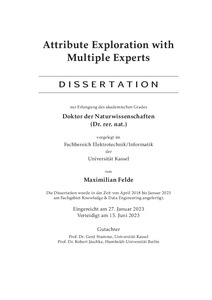| dcterms.abstract | Attribute exploration is a knowledge acquisition method from the realm of formal concept analysis that allows a domain expert to efficiently uncover the dependencies in a domain. It is based on a question-answering scheme where the exploration algorithm generates questions about dependencies in the domain that are then answered by a domain expert. Even though many variants and extension to this were developed, only few attempts to incorporate multiple experts were made. The overarching goal of this thesis is to extend attribute exploration to allow for multiple experts on a domain. To this end, we develop a framework based on the notion of views of a domain, represented as pairs of incomplete contexts and implication theories. We subsequently develop extensions of attribute exploration for multiple experts that have compatible views, or potentially conflicting views of the domain. Conflicting views occur, for example, if the experts’ views reflect their opinions, or if some of the experts are imperfect and possess faulty information. First, we recapitulate some basics of formal concept analysis, give a brief recap of attribute exploration with a single expert, and develop triadic exploration. Next, we discuss the problem of having multiple experts that participate in an attribute exploration, and provide an overview on related work. We generalize the information order for incomplete contexts and formalize the notions of a view of a domain, experts, and interaction with an expert. In order to model attribute exploration for multiple experts with compatible views, we introduce the notion of collaboration strategies. Additionally, we are concerned with the notion of maximal knowledge, i. e., the knowledge that a theoretical expert with the knowledge of all experts combined would have, and discuss how a group of experts is able to obtain it. We address the problem of potentially conflicting views of a domain by introducing the notion of shared implications, i. e., implications that hold in the view of all experts, and adapt attribute exploration in order to find the parts of the domain where the experts agree and the parts where they disagree. Finally, we perform and evaluate experiments to gain some first insights into the effort required by a group of experts to complete an attribute exploration with various collaboration strategies, or to complete an exploration of shared implications. To this end, we develop an improved generator for formal contexts based on Dirichlet distributions and use it to generate artificial domain experts based on real-world contexts in order to simulate explorations for the experiments. | eng |


